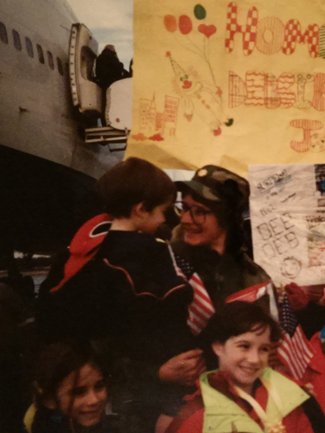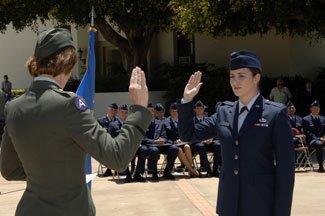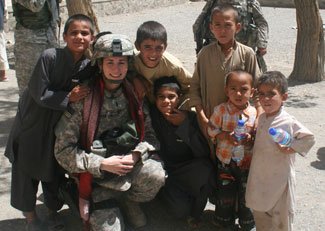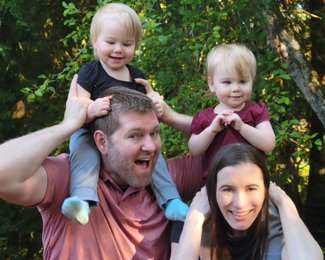My Family Took the Straight-and-Narrow Path. Why Was I the One to Diverge?
“You know what’s crazy?” I said. “I’m turning the same age you were when you went to war.”
“Oh wow,” my mom said, nodding thoughtfully from the couch. Then, “Wait, you’ll be 35?”
I laughed from where I reclined on the floor, stretching my aching back. The milestone snuck up on me too. Yet I could feel the age in my joints, so much more nagging than before I’d gone to war a decade earlier. “I can’t imagine going now,” I said. “There’s a reason the military recruits young. I don’t know how you did it.”
Mom shook her head. “Sometimes I don’t either.”

Lauren Kay Johnson’s mother was a 35-year-old mother of three when she came home from war. Photo courtesy of the author.
My return from Afghanistan in 2010 and difficulties adjusting back to “normal” life pried open a door my mom had closed after her service in Operation Desert Shield/Desert Storm. I was 7 when she’d gone to war and not privy to Mom’s post-deployment struggles. As a wife and working mother of three, she hadn’t had the luxury to wallow.
I wallowed in 2010, and Mom’s support quickly gave way to understanding. Decades, countries, and job titles separated our wartime experiences—she was an Army nurse and I was an Air Force public affairs officer. But at the emotional core, we were far more similar. Though we had always been close, war and its aftermath bonded us on a new, deeper level, the kind that can only come from shared experience.
Approaching 35, however, I began to wonder at the distance between us. In truth, the stiffness in my body compared little with the aging I felt in my spirit. I floundered amid what I referred to as a third-life crisis: recently divorced, in a job that left me depleted and only slightly less in debt, bumbling through a writing career in fits and starts. The oven in my Boston condo had been broken for four years. Sometimes fragments of bathroom ceiling rained down on me in the shower.
A phone call to my parents had inspired Mom’s visit.
“I think I need some Lauren time,” she’d mused, graciously deflecting my own desperation, which oozed in messy sobs. “Plus, I miss my grandcats. Maybe we can finally fix your oven! And your bathroom ceiling!”
Mom’s enthusiasm bolstered me, and the promise of her ever-stabilizing presence propelled me through the next few weeks. I hugged her at the airport like a 7-year-old. As always, her visit reminded me how similar we are. We blow-dried our thin brown hair and slathered our pale skin in sunscreen before a walk around the neighborhood. We fretted over politics and reminisced about my adolescent swim meets. Our emotions bubbled over into matching giggles or easy tears.
My new boyfriend even commented on our shared mannerisms, and I savored this.
But Mom’s presence also confronted me with our differences. I went to war at the age my mom had her first child. By 35, she’d given birth twice more, deployed, and returned to our house outside Seattle—the same house where my parents still lived.

Lauren Kay Johnson’s mother, a veteran of Desert Storm, reads the oath during her commissioning ceremony. Photo courtesy of the author.
She’d returned from war to a career that would carry her to retirement. To her three children. To an imperfect but solid marriage. Together my parents traveled the world and doted on their granddaughters, my sister’s girls—the eldest, twins, born while I was in Afghanistan.
My postwar decade left me scattered—five homes in three states, four jobs, four therapists, two antidepressant prescriptions, and a failed marriage to a fellow veteran. It hadn’t been all bad, of course. I bought a home. Earned a master’s degree. Wrote a book. Now nearing 35, I’d lived in the same place for seven years and put down something resembling roots.
And yet, what kind of roots were these that kept me working so hard but stuck in the same place? And if I hadn’t been content moving but wasn’t happy standing still, could my particular variety of restless soul ever be satisfied? Did it matter that I finally knew what I wanted if those things eluded me?
Award-Winning Journalism in Your Inbox
I confessed these worries to my mom. I told her I’d decided to become a parent on my own if I had to.
“You have plenty of time,” she assured me.
Mom worked as a labor and delivery nurse; she knew this, and I knew she was right, but I didn’t feel it.
Recently, I’d considered quitting my job and moving home to Seattle. I also harbored a fantasy of running away to Scotland and living my own version of Outlander (minus war, plus indoor plumbing).
Although I knew Mom’s life wasn’t without challenges, I couldn’t help comparing it to mine. I envied its straight and narrow path that diverged so little from that of her parents. My brother and sister had followed similar paths.
Yet this was the life I had chosen. I’d decided to leave home for college. I’d accepted an ROTC scholarship with its four years of obligatory military service that took me across the country and the world. I’d volunteered to deploy to Afghanistan.

Lauren Kay Johnson deployed to Afghanistan as an Air Force public affairs officer. Photo courtesy of the author.
In 1990, Mom had to leave. In 2009, I chose to.
I left the Air Force after four years and moved across the country again, this time to graduate school and unknown financial prospects of creative writing. I didn’t choose to fall in love. But I did choose to believe that love conquers all. (Spoiler alert: It doesn’t.)
After my divorce, I thought about running away, back to recalibrate from my childhood bedroom. Instead, I stayed and toughed it out. I leaped into a grinding corporate job, hating and relishing the all-consuming rush. I learned that there’s more than one way to run away.
Then I woke up on the verge of 35.
At the end of Mom’s visit, I tried to draw strength from the ghost of her hug. I tried to follow her advice: one day at a time.
One day at a time, I got out of bed. I went to work. I wrote. I got my stove fixed. My boyfriend became not so new.
I searched Google for celebrities who’d had babies in their 40s. I searched for rental homes in Scotland.
A few months later, I celebrated my 35th birthday with both my parents—a first since I was in high school. That felt significant somehow. After a day exploring the city, they treated me to a birthday feast with an ice cream cake and several glasses of wine. As my dad lifted his glass in a toast, my mom and I matched giggles. I remembered that I could wallow in happy times, too.
Our Journalism Depends on Your Support
Waking up one day into 35, I felt neither enlightened nor discouraged. But, for a moment, I felt something close to satisfaction.
My parents reminded me that I had more strength than I acknowledged. The sum of my scattered milestones and the experiences and lessons that came with them were not insignificant. The fragments of my dreams were starting to come together, albeit haltingly.
I couldn’t quite picture the pieces coming together yet. I couldn’t know that the following year I would move back to Seattle, accompanied by my now long-term boyfriend, or that I would find a job that excited me.

Lauren Kay Johnson with her husband and twins. Photo courtesy of the author.
I couldn’t know that my long-term boyfriend would become my husband and then, as the last of U.S. troops withdrew from Afghanistan, father to my own set of twins.
From my Boston condo, we couldn’t imagine my future, but we could celebrate the glimmers of hope. And we did. We toasted my brother and his new fiancee. We toasted my sister and her family. My twin nieces also had a birthday approaching. Later that month they would turn 9, the same age my sister was when Mom deployed. Born while I was in Afghanistan, the twins were a measure of how long I’d been back, how the world keeps spinning, and how much change and growth a decade can bring.
This War Horse reflection was written by Lauren Kay Johnson, edited by Kristin Davis, fact-checked by Jess Rohan, and copy-edited by Mitchell Hansen-Dewar. Abbie Bennett wrote the headlines.





Comments are closed.